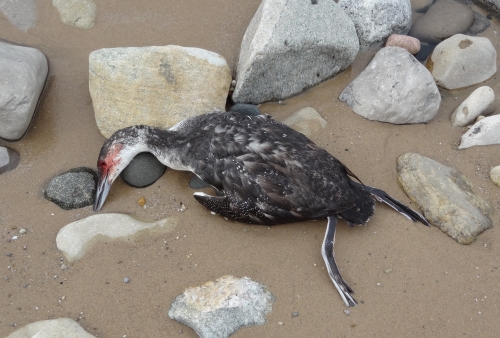Loons and other waterfowl impacted by Type E botulism in Northwest Lower Michigan
Waterfowl carcasses in Northwest Michigan have raised concerns for significant waterbird loss due to avian botulism. Citizens are encouraged to report sick or dead waterbirds as specimen collection continues.

Botulism is a neuromuscular disease caused by the bacterium Clostridium botulinum. In the Great Lakes, botulism spores (the resting stage of the bacteria) are abundant in anaerobic habitats, such as soils, and aquatic sediments of many lakes. When the correct environmental factors are present, the spores germinate and begin vegetative growth of the toxin-producing bacterial cells. The toxin probably then is passed through quagga mussels and into round goby fish, which can become paralyzed and are easily consumed by loons and other waterfowl.
In November 2006 and 2007, an estimated 2,900 waterbirds and 7,500 waterbirds, respectively, died in northern Lake Michigan. The birds were poisoned by eating fish that carried the toxin; however, in recent years, there were very low botulism kills. During the high kill years, most birds were impacted from mid-October through mid-November, so we may be in the peak of the impact season as the fall migration continues.
Observers can report sightings of sick or dead birds to the Michigan DNR wildlife disease reporting system.
For more information about avian botulism, please see the Michigan Sea Grant website or contact Mark Breederland, Michigan Sea Grant Extension at 231-922-4628.



 Print
Print Email
Email




